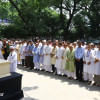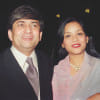A book that can't be made into film
Syed Fahim Munaim, the late CEO and Chief Editor of Maasranga Television, who died on June 1, can be best described as the life support system for an indefatigable smile. His beaming face was comparable to the British Empire where the sun never went down. His warm heart had the lure of a tourist destination that attracted people looking for rest and recreation. His exciting company gave the experience of an amusement park, full of shows, rides, and other events.
His death last week had the abruptness of blackout in a carnival. He died in his sleep when the night was breaking into dawn as if he wished to give the slip to the world before it woke up and asked for him. It was an anticlimactic end to someone who thrived on having people around him. He loved to go to parties, eat out, and travel. His phone had the busy traffic of a hotline, people ringing him and him ringing them all the time.
Yet when he died, it had the rudeness of someone on the other side of the phone hanging up in the middle of a call. For nearly three days his body lay in the morgue, and one wondered why he had to leave in a hurry if the journey was so delayed. Being a stickler for detail, he probably couldn't have planned that rush for himself.
Fahim bhai and I met in Washington, D.C. in 1978 at the screening of Bangladeshi film Lathial at the Kennedy Center. We reconnected many years later in Dhaka when we happened to be professionally relevant for each other. We have done countless breakfasts, lunches and dinners since then, leaving no new restaurant in town unexplored. We have attended numerous parties and receptions in the country, and travelled together to foreign destinations. He was the one who had encouraged me to write for The Daily Star when no other paper would touch me with a ten-foot pole.
One is reminded of the futility of life when a loved one is lost. Scientists claim that the afterglow light you see isn't really light at all. It's the result of residual activity of the nerve cells on the back of your eye, called the retina. When someone dies that afterglow is nothing but the residual activity of the nerve cells on the back of one's mind, called the memory.
Many of us will forever struggle with their memories of Syed Fahim Munaim. They will be adjusting lens, distance and angle to remember him not because he will be forgotten soon, but because they will never be satisfied with anything short of the real him. Family, friends and colleagues will forever seek him in flesh and blood for the same reason certain books can't be turned into films.
Fahim bhai got most of the things he wanted in life. He married the woman he loved and loved her for the rest of his life. Together they raised three sons, all of whom turned out to be gems. He reached the top echelons of his profession, made many friends, served his country with a couple of stints in the government, and was one of the most familiar faces on Dhaka's social circuit. We often quipped that Syed Fahim Munaim was so well connected that he could start his own telecom network.
There was hardly a restaurant in Dhaka where he didn't know everyone from the doorman to the owner. There was hardly a corporate house in Bangladesh where he didn't know the top executives. He knew people in every media house, trade body, diplomatic mission, NGO, and production house. He was well-liked by politicians, intellectuals, writers, academicians, players, actors, singers, diplomats, businessmen and journalists. Syed Fahim Munaim was like a crochet hook in a constant process of creating relationship by interlocking loops of goodwill and friendship.
American journalist Norman Cousins said that the greatest loss in life isn't when we die but when something dies inside us while we live. If mind is compared to a house, Fahim bhai's death has vacated a room inside each one of us who loved him. Each one of us died a small death on the day he died, and each one of us had a mini-burial with him.
What will Fahim bhai be remembered for? He isn't known for the conquest of a kingdom. His wasn't an inventive mind that postulated an overwhelmingly great idea. He didn't hold any supremely powerful position. Yet, he will be remembered if not for living the life of a great man but for a life lived in a great way.
Syed Fahim Munaim will be remembered most for what he had in common with sunshine, moonlight, gentle breeze and fragrance of flowers. He stirred something in us that made us feel good.
The writer is the Editor of weekly First News and an opinion writer for The Daily Star.
Email: [email protected].

 For all latest news, follow The Daily Star's Google News channel.
For all latest news, follow The Daily Star's Google News channel. 








Comments